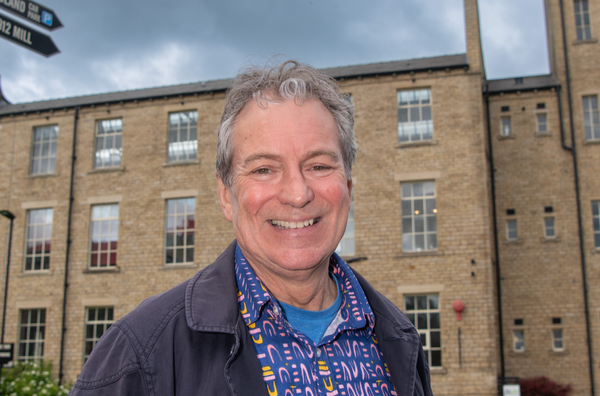Ex-Emmerdale star helps Sunny Bank Mills to celebrate 10 years of arts and culture





Actor John Middleton, best known for his award-winning portrayal of vicar Ashley Thomas in Yorkshire Television’s Emmerdale, has paid a nostalgic trip to where the programme used to be filmed.
John visited Sunny Bank Mills in Farsley, near Leeds, and recalled many happy memories at the historic mill complex.
Emmerdale was filmed at the iconic 1912 Mill at Sunny Bank from 1988 to 1999, before moving to a purpose-built village on the Harewood Estate.
John remembered: “I joined Emmerdale in 1994, first of all playing a police officer at the scene of the famous Emmerdale Post Office siege, before morphing into the Rev Ashley Thomas. No-one seemed to notice. At first, I was told Ashley would just be involved in hatches, matches and despatches, but he grew into a integral part of the series, culminating in his harrowing dementia and death in 2017.
“We filmed the siege episode behind the 1912 Mill – that was my first introduction to Sunny Bank Mills. The cast had some tremendous times here and it was a memorable experience filming in one of Yorkshire’s most historic textile mills.
“When we were filming, it was important to keep the noise down, which wasn’t always easy as we were working in a busy mill complex. So, when filming started, a very loud bell would ring out to ask everyone to be quiet, and that bell is still preserved on site today.
“It will probably come as no surprise to anybody that we used to unwind after filming in Farsley’s excellent pubs and it felt great to be part of the village community.”
William Gaunt, co-owner and managing director of Sunny Bank Mills with his cousin John, revealed that Yorkshire Television’s decision to film Emmerdale and Heartbeat at the 1912 Mill saved the imposing mill building from demolition.
“The 1912 Mill is a crucial part of Sunny Bank Mills but it was under threat in the 1990s because it was a spinning mill and, by then, all our spinning had been outsourced. Had YTV not come along with a generous contract, following a chance conversation, the mill would have been razed to the ground.”
“It’s interesting to note that my great grandfather Billy Gaunt, who owned Sunny Bank Mills back in the 1920s, also ran five west End theatres, so there’s always been a strong artistic and cultural tradition here, which Emmerdale reinforced.”
John Middleton, who has just returned from a successful international touring production of My Fair Lady, said he was tremendously impressed how the Gaunts had transformed the Sunny Bank Mills of the 1990s into the magnificent mixed-use commercial, cultural and community complex it is today.
His visit celebrated the tenth anniversary of the Gaunts’ significant decision to embark on an ambitious programme of cultural regeneration, which has seen Sunny Bank emerge one of the most innovative and exciting artistic cultural centres in the region.
The two cornerstones of the cultural regeneration are the Art Gallery which runs a rolling exhibition, events and engagement programme supporting regional artists and creatives, and the mill’s historic Archive, one of the most significant and substantial woven textile archives in the UK, which has received a substantial grant from The National Lottery Heritage Fund.
These have been supplemented by 25 artists’ studios and, in recent years, the development of the Old Woollen, a 500-capacity events venue.
In the past 10 years, the Gallery has hosted 75 exhibitions supporting over 1,000 artists and makers, and introduced creative events including a regular print fair, a new textile festival and a hugely successful Christmas market; while the Old Woollen has welcomed a host of household names including comedian Arthur Smith, national treasure Gyles Brandreth, historian and television personality Lucy Worsley and writer and DJ Mark Radcliffe. There are now 500,000 visits to the mill annually.
John Gaunt commented: “If I had been told those figures as projections 10 years ago, I wouldn’t have believed them. But thanks to an excellent team we have exceeded all expectations.”
William Gaunt added: “The growth of our cultural offering has been crucial to the sustainable development of the Mill so whilst we are maintaining our proud connection with the arts and heritage, we are doing this alongside the sustainable development of the mill complex, which means a delicate balancing act between commercial and cultural interests.
“We have this year welcomed our 100th business on site, with 400 new jobs created, but it is crucially important that we create an environment where people don’t just love to work, but also to play, live and learn.”
Sunny Bank’s cultural anniversary coincides with Leeds 2023, when with the city showcasing its artistic and cultural strength. Sunny Bank is embracing this celebration, as Leeds takes centre stage in the UK’s cultural landscape.